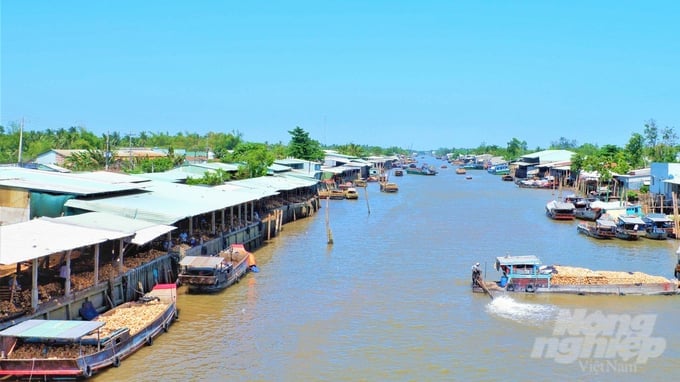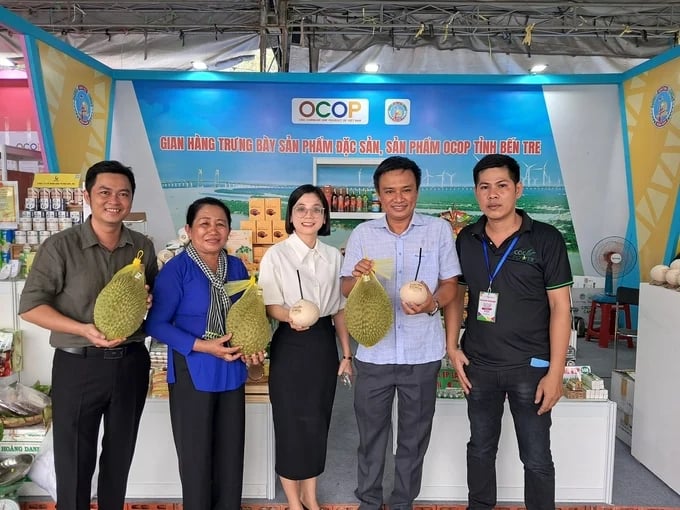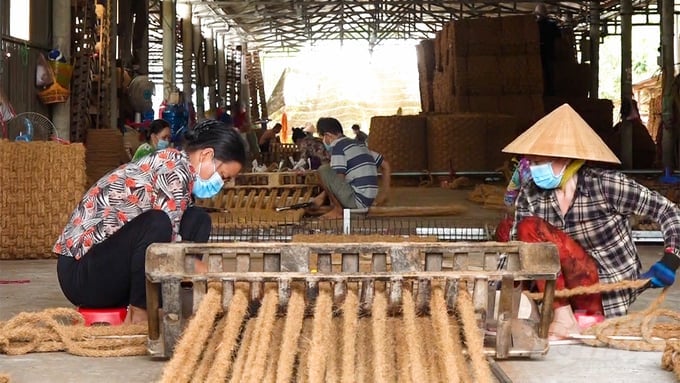June 17, 2025 | 20:42 GMT +7
June 17, 2025 | 20:42 GMT +7
Hotline: 0913.378.918
June 17, 2025 | 20:42 GMT +7
Hotline: 0913.378.918

Many cooperatives in Ben Tre are beginning to understand the market development mechanism, and proactively link up and produce products according to business requirements. Photo: Kieu Trang.
In order to widely implement Resolution No. 19-NQ/TW on agriculture, farmers and rural areas until 2030, with a vision to 2045, the Ben Tre Provincial Party Committee has issued Program No. 30-CTr/TU to direct the study, thorough understanding, and organization of propaganda to implement the spirit of the resolution.
Next, the People's Committee of Ben Tre province implemented plan No. 378/KH-UBND assigning tasks to departments, branches and localities to develop programs and plans or integrate them into sector and unit plans for synchronous implementation.
In addition, the Vietnam Fatherland Front Committee of Ben Tre province encourages members to participate in building a model for developing commodity agricultural production by applying technology; establishing cooperatives/ cooperative groups, and economic development enterprises in rural areas associated with propaganda and the campaign for "Uniting the people in building new rural areas and civilized cities".
Although initially there were many difficulties, the results after one year of implementing Resolution No. 19-NQ/TW showed that Ben Tre has gradually transformed towards the goal of building an effective and sustainable agricultural economy in an ecological direction. Currently, the locality has successfully carried out much scientific research and scientific implementation - advanced technology in the agricultural sector, constantly improving the quality, value and competitiveness of products.
The highlight of Ben Tre province's agricultural industry today is that the locality has 67 cooperatives and 71 cooperatives, initially building a concentrated production area and forming value chains of key agricultural products to meet market demand and raw material needs of agricultural processing facilities.
Accordingly, the application of a quality management system according to GAP, organic standards, and issuance of planting area codes and packaging facility codes for key products are also receiving attention locally.
In addition, the Department of Agriculture and Rural Development coordinated with the Department of Science and Technology and the Department of Industry and Trade along with relevant departments to promote the creation and development of intellectual property, as well as trade promotion to support the search, pursuit and expansion of domestic and foreign consumption markets.
By November 2023, Ben Tre will have more than 25,000 ha of production area according to organic, GAP and equivalent standards. Including 18,000 haof coconut trees, 667 ha of fruit trees, and more than 6,200 ha of aquatic products; 36 growing areas serving export (71 codes) with a total area of nearly 600 ha; there are 13 inland growing area codes with a total area of 642 ha.
Regarding the program of one OCOP product per commune, cumulatively recording until November 2023, in the province there have been 244 OCOP products achieving 3 stars or higher. Including 154 3-star products, 86 4-star products, and 4 5-star products with 105 OCOP subjects.

Ben Tre province promotes trade promotion to support advertising, finding and expanding domestic and foreign consumption markets. Photo: Tan Phu Agricultural Cooperative.
In the period 2021 - 2022, the locality has supported collective trademark registration for 16 agricultural cooperatives; announced 4 community brands, bringing the total number of community brands in the province to 46 brands; Creating intellectual property rights for trademarks; Issuing certificates of rights to use geographical indications of "Ben Tre" and "Cai Mon".
In addition, Ben Tre province is especially interested in promoting the digital conversion program in the agricultural sector due to the program playing an important role in restructuring the agricultural sector and developing concentrated commodity agriculture in a modern direction, supporting redirection to increase the added value.
The locality is developing a software module for food safety management and traceability of agricultural, forestry and fishery products. Developing the software subsystem for GIS maps to monitor and predict the water environment in clam management in districts. Organizing training and guiding business households and cooperatives on how to bring products to e-commerce platforms.
In addition to the agricultural sector, by implementing resolution 19-NQ/TW, Ben Tre province aims to improve the role and mastery of farmers in rural areas; and build and develop rural areas towards modernization.
Accordingly, to enhance the role and ability to master as well as comprehensively improve the material and spiritual life of farmers, the locality has promoted the development of industry, services, and human resource training in agriculture and rural areas.
In 2023, the province allocated investment capital of about VND 62,270 billion to build the infrastructure of industrial clusters, attracting 28 investment registration projects with a total registered capital of about VND 7,839 billion, creating jobs for about 9,953 workers.
On the other hand, the locality is now focusing on implementing the national target program to build new rural areas. Currently, in the province, there are 96 communes meeting rural standards, reaching 69.1% of the target set until 2030. At the same time, Ben Tre promotes innovation and development of agricultural cooperatives/cooperating groups and the farm economy. Focusing on the connection between farmers, cooperative organizations of farmers and businesses in the production, harvesting, preservation, processing and consumption of agricultural products.
Mr Vo Tien Si, Deputy Director of the Department of Agriculture and Rural Development of Ben Tre province, assessed that the current production activities of the cooperatives/cooperating groups have had good changes, many cooperatives have begun to understand the market development mechanism, proactively link and produce products according to business requirements, gradually forming a sustainable value chain; able to apply organic and GAP production processes in a methodical way, meeting the requirements of businesses, gradually forming a sustainable chain linkage.

Ben Tre province promotes the development of products from coconut shells such as coconut fibre mattresses, coconut fibre mats, and coconut shell-activated carbon. Photo: Kieu Trang.
In addition, Ben Tre has implemented many solutions to develop green agriculture, reduce emissions and effectively respond to climate change, effectively use resources; and overcome environmental pollution in agricultural and rural areas.
Translated by Hoang Duy

(VAN) The UNESCO Global Geopark revalidation of Non nuoc Cao Bang and the transition to a two-tier administrative model are presently undergoing a pivotal moment in Cao Bang, the northernmost province of Vietnam.
/2025/06/13/5330-2-004539_953.jpg)
(VAN) Changing policy mindset and removing investment barriers are urgent requirements to open up new development space for enterprises in the agricultural sector.

(VAN) The areas include the restoration of five million hectares of marine ecosystems.

(VAN) Dr. Le Van Nguyen, Director of the Institute of E-Commerce Management (ECM), emphasizes the potential for green development through the cultivation of fruit trees, particularly in provinces such as Son La.

(VAN) VAAS and numerous Vietnamese enterprises have signed cooperation agreements with Japanese partners to promote agricultural technology and trade connectivity.
/2025/05/29/5625-12-214801_567.jpg)
(VAN) Provincial mergers in the Mekong Delta promise to streamline administration, expand inter-provincial raw material areas, and foster close linkages in agricultural value chains, benefiting both businesses and cooperatives.

(VAN) Merging Mekong Delta provinces contributes to the expansion of agricultural raw material areas, addressing previous constraints caused by provincial boundaries. Additionally, this expansion will reduce costs and strengthen linkages between businesses, cooperatives, and farmers.